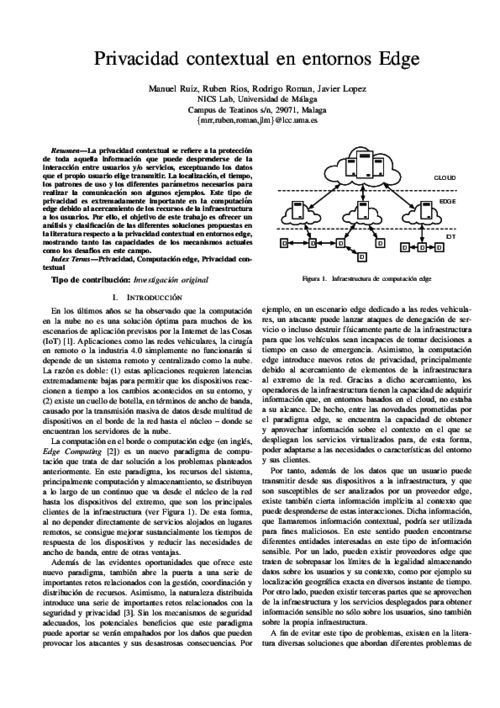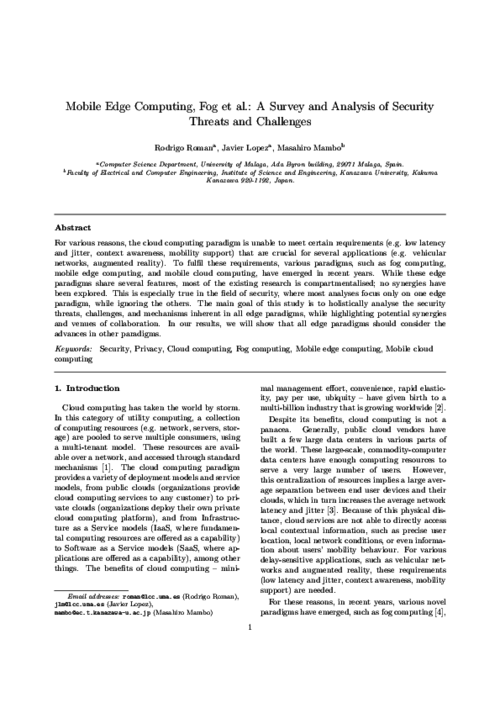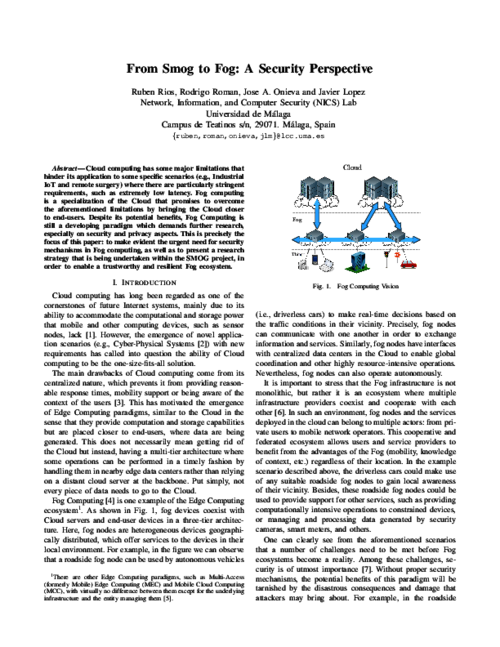 ] Title Type Year
] Title Type Year VII Jornadas Nacionales de Investigación en Ciberseguridad (JNIC 2022), pp. 122-129, 06/2022.
Abstract
La privacidad contextual se refiere a la protección de toda aquella información que puede desprenderse de la interacción entre usuarios y/o servicios, exceptuando los datos que el propio usuario elige transmitir. La localización, el tiempo, los patrones de uso y los diferentes parámetros necesarios para realizar la comunicación son algunos ejemplos. Este tipo de privacidad es extremadamente importante en la computación edge debido al acercamiento de los recursos de la infraestructura a los usuarios. Por ello, el objetivo de este trabajo es ofrecer un análisis y clasificación de las diferentes soluciones propuestas en la literatura respecto a la privacidad contextual en entornos edge, mostrando tanto las capacidades de los mecanismos actuales como los desafíos en este campo.

18th International Conference on Applied Cryptography and Network Security (ACNS’20), vol. 12147, Springer, pp. 297-320, 10/2020. DOI

Future Generation Computer Systems, vol. 78, issue 1, Elsevier, pp. 680-698, 01/2018. DOI
Abstract
For various reasons, the cloud computing paradigm is unable to meet certain requirements (e.g. low latency and jitter, context awareness, mobility support) that are crucial for several applications (e.g. vehicular networks, augmented reality). To fulfil these requirements, various paradigms, such as fog computing, mobile edge computing, and mobile cloud computing, have emerged in recent years. While these edge paradigms share several features, most of the existing research is compartmentalised; no synergies have been explored. This is especially true in the field of security, where most analyses focus only on one edge paradigm, while ignoring the others. The main goal of this study is to holistically analyse the security threats, challenges, and mechanisms inherent in all edge paradigms, while highlighting potential synergies and venues of collaboration. In our results, we will show that all edge paradigms should consider the advances in other paradigms.

2nd IEEE International Conference on Fog and Edge Mobile Computing (FMEC 2017), IEEE Computer Society, pp. 56-61, 06/2017. DOI
Abstract
Cloud computing has some major limitations that hinder its application to some specific scenarios (e.g., Industrial IoT, and remote surgery) where there are particularly stringent requirements, such as extremely low latency. Fog computing is a specialization of the Cloud that promises to overcome the aforementioned limitations by bringing the Cloud closer to end-users. Despite its potential benefits, Fog Computing is still a developing paradigm which demands further research, especially on security and privacy aspects. This is precisely the focus of this paper: to make evident the urgent need for security mechanisms in Fog computing, as well as to present a research strategy with the necessary steps and processes that are being undertaken within the scope of the SMOG project, in order to enable a trustworthy and resilient Fog ecosystem.
